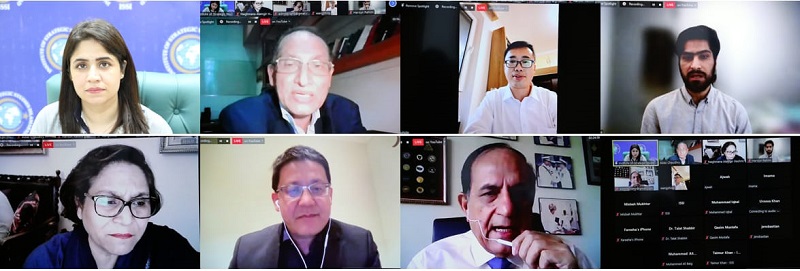PRESS RELEASE
Panel Discussion
Conversations on the Evolving Situation in Afghanistan: China’s Role in Afghanistan
October 08, 2021

The Centre for Afghanistan, Middle East & Africa (CAMEA) at the Institute of Strategic Studies Islamabad (ISSI) held a Panel Discussion on ‘Conversations on the Evolving Situation in Afghanistan: China’s Role in Afghanistan’ which is the eighth in a series of conversations CAMEA will be having on Afghanistan – under its Conversations on the Afghan Peace Process series.
The distinguished speakers included: Ambassador Naghmana Hashmi, Pakistan’s former Ambassador to China, Mr. Wang Shida, Deputy Director, Institute of South Asian Studies, China Institutes of Contemporary International Relations (CICIR), Dr. Haiyun Ma, Associate Professor, Frostburg State University, Dr. Haroun Rahimi, Assistant Professor of Law at the American University of Afghanistan. Ambassador Aizaz Ahmad Chaudhry, Director General ISSI also participated in the discussion.
During her opening remarks, Ms. Amina Khan, Director CAMEA stated that The situation in Afghanistan has drastically changed with the Taliban takeover and US withdrawal. While the Taliban have established an interim government, the real test for the Taliban has only just begun – which is certainly not limited to the capture of power, but is more about legitimacy, recognition, acceptance, and performance. Even within the confines of the current Taliban dominated set up, a lot will depend on whether the Taliban can deliver – in terms of governance, foreign relations, human rights and more importantly CT assurances. Regional countries have come to the forefront to play a more prominent role in Afghanistan and one such country is China. Since 2014, China has moved away from its limited role, to a more proactive one by not only supporting but also facilitating the Afghan Peace process by being a part of a number of trilateral and multilateral initiatives. Beijing’s growing tilt towards Afghanistan can also be attributed to political, security and economic interests, primarily concerns regarding the fear of transnational terrorist groups such as ETIM as well as challenges to connectivity projects such as the CPEC.
Ambassador Aizaz Ahmad Chaudhry, in his opening remarks stated that the top priority at this point in time is to address the humanitarian crisis in Afghanistan, which, if left unattended may turn very ugly. He also pointed out that an area of concern is the possibility of the Taliban government collapsing if timely technical and financial assistance is not provided. This may lead to a civil war and resulting instability- something which all of Afghanistan’s neighbours are concerned about. He went on to say that the approach taken by Western countries to push the Taliban to deliver and not facilitate them is contradictory. Another area where China is well positioned to deliver is on counter terrorism, Ambassador Chaudhry highlighted.
Ambassador Naghmana Hashmi while expressing her views said that the Taliban have very limited experience in dealing with economy and governance because of which they need to be assisted. At the same time the Taliban cannot be expected to resolve the evolving crisis in Afghanistan without any foreign assistance. Hence, it is in all stakeholders’ interest to make sure that Afghanistan does not face any humanitarian crisis. She went on to say that, the international community has been stressing for an inclusive government and therefore, there should be a broad based government in Afghanistan so that there are brighter prospects of peace and reconciliation in the country. The Taliban cannot balance the trust deficit all alone which is why the international community must also soften to find a common ground. Moreover, their resources should be unfrozen slowly and they should be provided economic and humanitarian assistance. The fact that no regional country has yet formally recognised the new Taliban government shows that there is a regional consensus regarding Afghanistan. A war-ravaged and developing country cannot be expected to suddenly become a model of human rights. The requirements of every country’s population are different depending upon their history, culture and other realities.
Mr. Wang Shida, while expressing his views said that the Taliban regime faces a lot of challenges. The first of these is the formation of an inclusive setup which will determine the stability of the Taliban regime. Presently, the question of whether the Taliban can be trusted remains. He said due to limited resources, the Taliban are facing a severe economic challenge which should come as no surprise given that Afghanistan has been at war for more than forty years. In such conditions no country can exploit their natural resources, nor accrue financial benefits from them. It is high time for the international community to engage with the Taliban, to have a secure and peaceful region. As of now the core concern in Afghan foreign policy is about security and international acceptance. In the near future international acceptance and recognition is possible, although the US and the European countries would be the last to recognise the Taliban government.
He added that, Taliban have assured that they will not let any other forces use Afghan soil to sabotage China’s peace and national security interests; they have given the same assurances to other regional countries including Pakistan. Until now the Afghan Taliban have said that the ETIM has been asked to leave the country and this is a good start.
Dr. Haiyun Ma in his remarks said that the bilateral security relations and regional security are the top concerns for China regarding the Taliban and Afghanistan. China’s peaceful rise, the success of BRI and maintaining regional order are all interconnected with the regional security which depends on peace in Afghanistan. He said that ETIM is also a major and mutual concern for China and the Taliban; however, ETIM cannot be pushed too hard because if they join hands with ISKP it will be even more dangerous for China as well. In a way the ISKP is even a greater threat than the ETIM. What China can do to promote security is to encourage the Taliban to perform better through using proper channels of SCO and the UN. Dr. Ma said without peace development is impossible. In the past 20 years, the so-called nation building by the US completely failed. For China, stability is a priority. At the moment, the Taliban is the only force that can control Afghanistan. It is imperative for the international community to engage with the Taliban in order to ensure peace and stability in Afghanistan, he said.
Dr. Haroun Rahimi said that Afghanistan is facing a number of crises out of which the humanitarian crisis is at the forefront and needs urgent attention. There is also an impending security crisis- something which the regional countries are particularly concerned about. The mentality of the Taliban as a fighting group remains unchanged. There is also a deep trust deficit between the Taliban and the international community and this need to be rectified if they are to deliver efficiently. Regarding girls education he mentioned that, it is just rhetoric that Taliban have used in their last regime too, as they never formally said that the women would not be allowed to receive education, rather they said that conditions are not right and it will take time for things to figure out. Dr. Rahimi went on to say that their non-inclusive setup has increased resistance throughout the country; therefore keeping the cohesion between the group is a challenge for the Taliban. He pointed out that the Taliban have a minimalistic approach towards their commitment and a maximalist approach towards their need for assistance. He also highlighted how many countries have legitimate interests in Afghanistan regarding terrorism and said that the Taliban seem to be sleep walking into a disaster which is dangerous for not only Afghanistan but the region as a whole.












